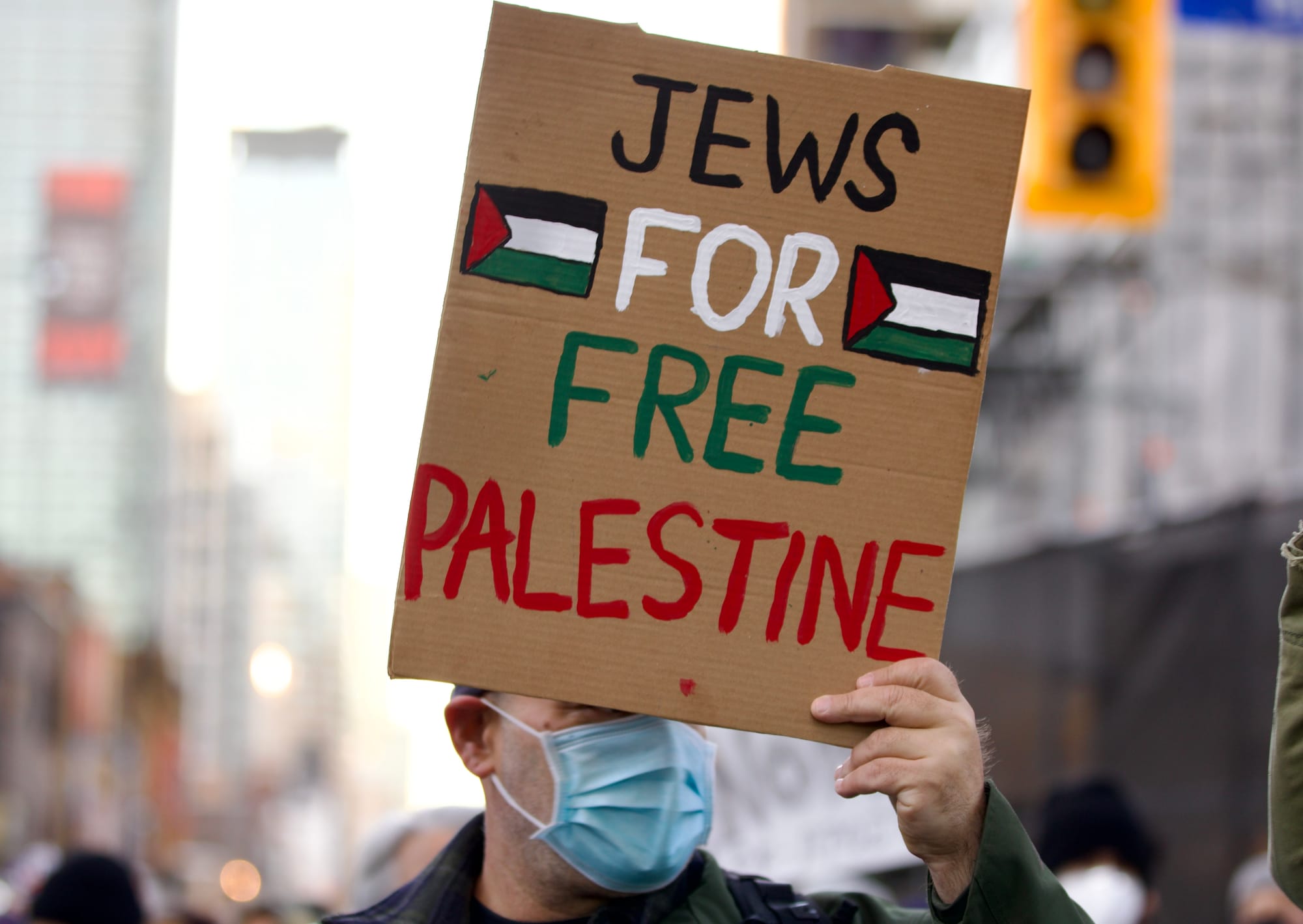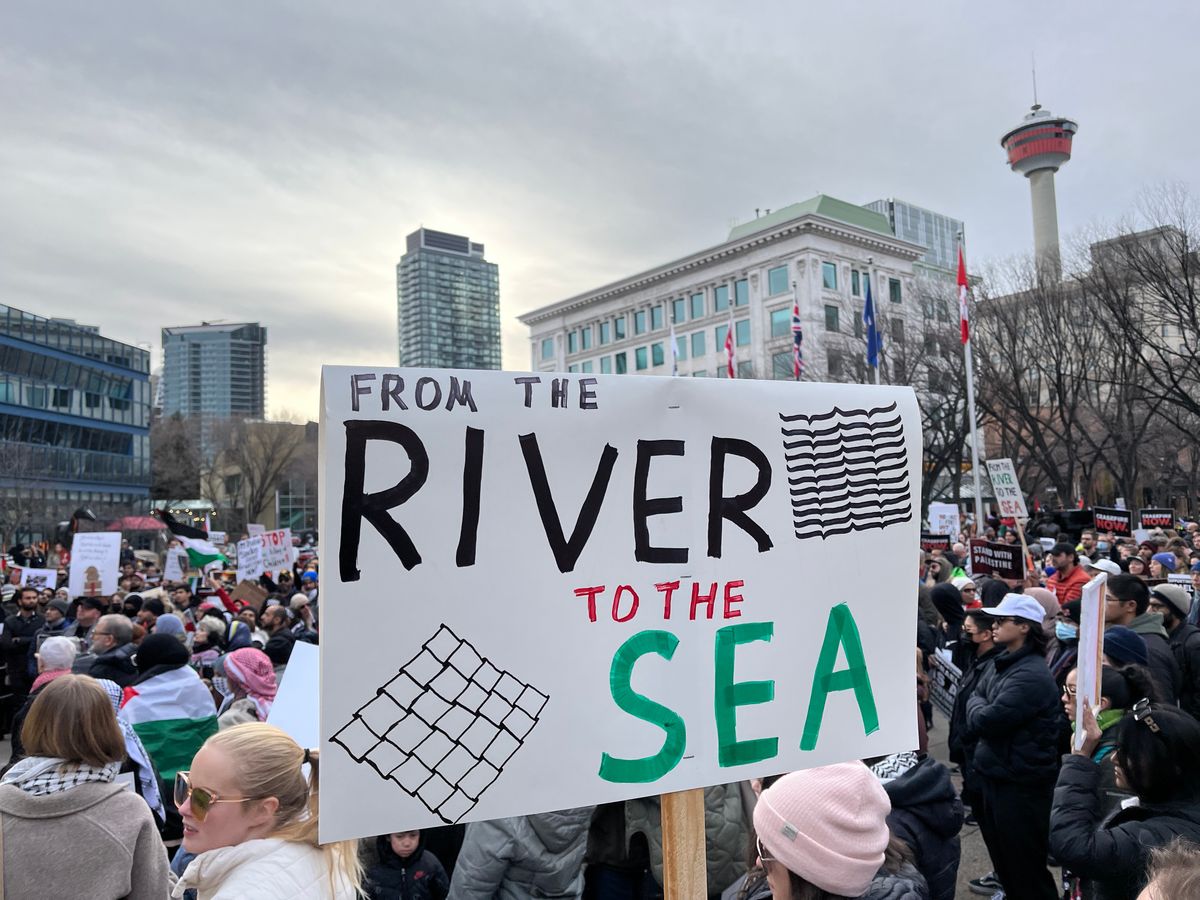Jewish activists across the world have attended pro-Palestinian protests for the past six months to stand against Israel’s war on Gaza, which is being examined at the International Court of Justice (ICJ) as a “plausible” case of genocide.
Many of those Jewish activists face claims from some of Israel’s supporters that they are not really Jewish, or that they are “self-hating.” Activists say these insults erase a long history of Jewish solidarity in fighting against oppression and opposing Zionism.
David Mivasair, a retired rabbi living in Hamilton who served two different synagogues for about 23 years in Vancouver, told The Maple he has frequently received such allegations on social media and in the Jewish community because of his stand against genocide in Gaza.
“Zionist organizations and people try everything they can to discredit me,” Rabbi Mivasair explained. Some Hamiltonians wrote letters to the editor of a local newspaper claiming he is an antisemite.
“I became a rabbi, and I spent my entire life promoting Judaism,” he said.
Rabbi Mivasair is not invited to any meetings or events held at Jewish schools, seniors’ homes, family service centres, or summer camps run by pro-Israel organizations because of his position on Israel. He said that he is a “persona non grata” among such groups.
Zionism, a movement which began in Europe in the late 19th century, is a form of Jewish nationalism and is the political ideology that drove the establishment of the state of Israel.
Theodor Herzl, known as the founder of Zionism, established the Zionist Congress in 1897. For decades, a majority of Jewish people around the world opposed the Zionist movement on religious or political grounds, and Herzl’s project only became the majority view among Jewish people in the 1920s and 1930s — although it still faced significant Jewish opposition.
The Zionist project achieved its goal of establishing the state of Israel in 1948 by ethnically cleansing about 750,000 Palestinians from their homeland and forcing them to become refugees. Palestinians refer to this event as the Nakba, which means “catastrophe” in Arabic.
“Every single act perpetrated by the Israeli government and military against the Palestinian people — since 1948 to present — goes against the core tenets, ethics, laws, beliefs and morality of the Jewish religion,” said Gur Tsabar, a member of Independent Jewish Voices Canada (IJV) and a media spokesperson for the Jews Say No to Genocide Coalition in Toronto.
Widespread Solidarity
Thousands of Jewish pro-Palestinian protesters in Canada and the United States joined early rallies to call on their governments to support a ceasefire in Gaza and to impose an arms embargo on Israel. These activists often carried slogans refuting Israel’s insistence that its actions are done in their name.
After Hamas led an attack on southern Israel on October 7, Israel launched a massive assault on Gaza that has killed at least 34,454 Palestinians, displaced 85 per cent of the long-besieged enclave’s population, and plunged the region into a humanitarian catastrophe. At least 70 per cent of the population faces catastrophic hunger.
Many activists have been arrested for participating in protests against Israel’s actions at places ranging from Grand Central Station to university campuses. Rabbi Mivasair was arrested at a demonstration organized in the U.S. on October 18 by Jewish Voice for Peace and If Not Now.
“We were pushing Congress and the U.S. to call for a ceasefire and to stop Israel’s slaughter of Palestinians,” Rabbi Mivasair said.
When images of these demonstrations were published on social media, some users falsely claimed that the Jewish participants were not really Jewish.
Corey Balsam, the national coordinator of IJV, told The Maple that “IJV members often receive negative reactions from fellow Jews over our support for Palestinians.”
Balsam, who advocates for “the right of all people to thrive and be free from oppression,” feels a sense of responsibility to speak up because what Israel is doing, and what pro-Israel lobby organizations are defending, “is said to be in my name.”
He noted that Judaism is a religion, and Zionism is a political ideology that was developed around 130 years ago.
“[Palestinians] have been the victims of a terrible injustice of Zionists coming and taking their homes and their land and mistreating them horribly for about 80 years,” Rabbi Mivasair said. “I feel a responsibility to end that, as a Jew.”

Tsabar has also been regularly attending rallies calling for an end to Israel’s brutal attack on Gaza.
He is subject to “negative comments from various Zionist trolls” on social media whenever he speaks about Israel’s actions publicly.
Those who claim that pro-Palestinian Jews are somehow not really Jewish are “by my definition, completely unhinged if they somehow have come to believe that they have been bestowed with some magical power to decide who is and is not a Jew,” said Tsabar.
Public Disputes
Jewish opposition to Zionism stands in stark contrast to pro-Israel organizations that insist anti-Zionism is a form of antisemitism. These conflicting views have been apparent in a number of public disputes in recent months.
For example, the Centre for Israel and Jewish Affairs (CIJA) issued a press release on February 9 stating that Jewish members of the Public Service Alliance of Canada (PSAC) filed 14 individual complaints against their union for, in CIJA’s words, “advancing an anti-Israel agenda and causing a culture of discrimination and harassment against Jewish PSAC members.”
The complaints followed PSAC publicly joining calls for a ceasefire in Gaza and an “end to the blockade of Gaza and for the restoration of humanitarian aid and access to the basic necessities of life.” CIJA said that its legal task force connected the complainants with an offer of pro-bono legal assistance.
On February 21, IJV published its own statement that rejected the complaint as “yet another example of the wilful and dangerous conflation of legitimate criticism of Israel with antisemitism.”
“Spurious complaints such as these undermine the struggle against antisemitism by obscuring what actual antisemitism looks like,” the statement continued.
Last month, Federation CJA, a pro-Israel Jewish community organization, obtained an injunction banning pro-Palestinian demonstrations near their property in Monteal. Protests outside the organization’s building occurred in early March when it hosted a speech by former Israeli soldiers.
The injunction also prohibited demonstrations outside a synagogue that attracted a protest when it hosted a real estate tour that, as explained by IJV, advertised “illegal Israeli settlement properties.” In a statement, IJV said that it was the events, not the fora, that prompted the protests.
“Despite the Federation’s dangerously misleading claims in their lawsuit, synagogues and Jewish community buildings are not being protested for being Jewish cultural or religious spaces,” IJV said in its statement.
Based on the injunction, IJV, Montreal4Palestine, the Palestinian Youth Movement and Alliance4Palestine will not be able to organize protests outside the venues should similar events take place inside them in the future.
IJV said that while it would respect any court order, it pledged to fight the injunction, stating that “As Jewish community members in Montreal, we clearly and loudly defend the right to protest against violence and land theft.”
Pro-Palestine protests have also been subject to claims that their chants, such as “from the river to the sea, Palestine will be free,” are antisemitic.
Calgary police charged 32-year-old Wesam Khaled for chanting the slogan last November, before the charge was stayed.

Palestinians and Jewish solidarity activists have long explained that this phrase is not antisemitic, but rather represents a call for equal democratic rights.
“It is a clear statement of the Palestinian desire for freedom and self-determination on the land they have long inhabited — between the Jordan River and the Mediterranean Sea,” Tsabar said.
Despite Palestinian solidarity activities continuing to be restricted and threatened, Balsam said IJV has received positive reactions from young Jewish people, especially in the last six months.
“This is reflected in the massive influx of new members to IJV since October 7, particularly among Jewish youth,” he said.
Nur Dogan is a Turkish-Canadian freelance journalist and photojournalist.









Member discussion